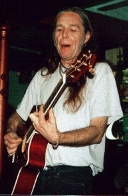Posted @ 13:00One of those moments
They happen now and again: if they were not so rare they wouldn't be so special. But, just once in a while, there are moments, induced by some book, film, play or music, which move you to tears or some equally deep emotional response. It's happened to me; I've seen it happen to others.
You know the sort of thing: you see a film for the first time and it captures, beyond expectation, the circumstances of your life; you hear a song which excites and amazes; you read a passage in a book which sums up everything that's important at the time or simply moves you. It is sometimes a particular moment or phrase; at other times it is the tone and manner of the entire experience (often intimately entwined with the company in which you share the experience).
For me, such moments forever engrained in my memory and are shining gems in the otherwise dark caverns of my life. There are songs: Sam Cooke's Darling You Send Me, Shanghai's Solaris (from the Fallen Heroes album; particularly that "I don't know yet…"), Bruce Springtsteen's Jungleland (from the Born To Run album; particularly Clem Clemen's saxophone solo) and The Incredible String Band's Big Huge album. There's Molly Bloom breathing "Yes" and Rick & Elsa parting on the airport tarmac. There's Ophelia bidding "Goodnight, sweet ladies, goodnight" before she vanishes forever. There's Eliot's "Oh you who turn the wheel and look to windward; Consider Phlebus, who was once as tall and as beautiful as you". There's The Big Lebowski and Brother, Where Art Thou?. And Apocalypse Now and Fat City. There's an enamelled purse lid discovered at Sutton Hoo and now resident in the British Museum. There's the Dali's Gospel According To St. John. And Gieger's house in Gruyère. There's waking and seeing Les Dents De Midi at Evian from my bedroom window. There's watching the smiles and sheer talent of all those once hesitant, but now confident, performers who have appeared at the Tap & Spile. I could go on, but won't — I had prepared a long list but omitted the rest because they were too excessive or too personal.
You've all got your own examples: rare, beautiful, precious and unique. But, usually, these little epiphanies of ours happen at a great distance in time and space from the creators of the object or experience.
I, however, have been granted the rare privilege — not often experienced by the creators of such artefacts — of seeing someone so moved by something I did; and I was moved as well. To know that you've moved someone so directly and significantly is directly and significantly moving. My friend had "one of those moments" (soppy beggar was moved to tears) and it has also become one of my moments. I am humble and honoured to have had such an effect. I'm also amazed and shocked that I am capable of such things: cynical old bastard that I am, I presumed myself possessed of an immunity to causing such responses (I found ET manipulative, messianic and moronic; I can't watch the damn thing, I think it so poor and so blundering in its desire to evoke an emotional response). But, this little incident has made up for the hundreds of times I've played songs and felt that no-one was listening, or cared.
The identity of the "soppy beggar" and the song in question are a closely guarded secret, so don't ask.








